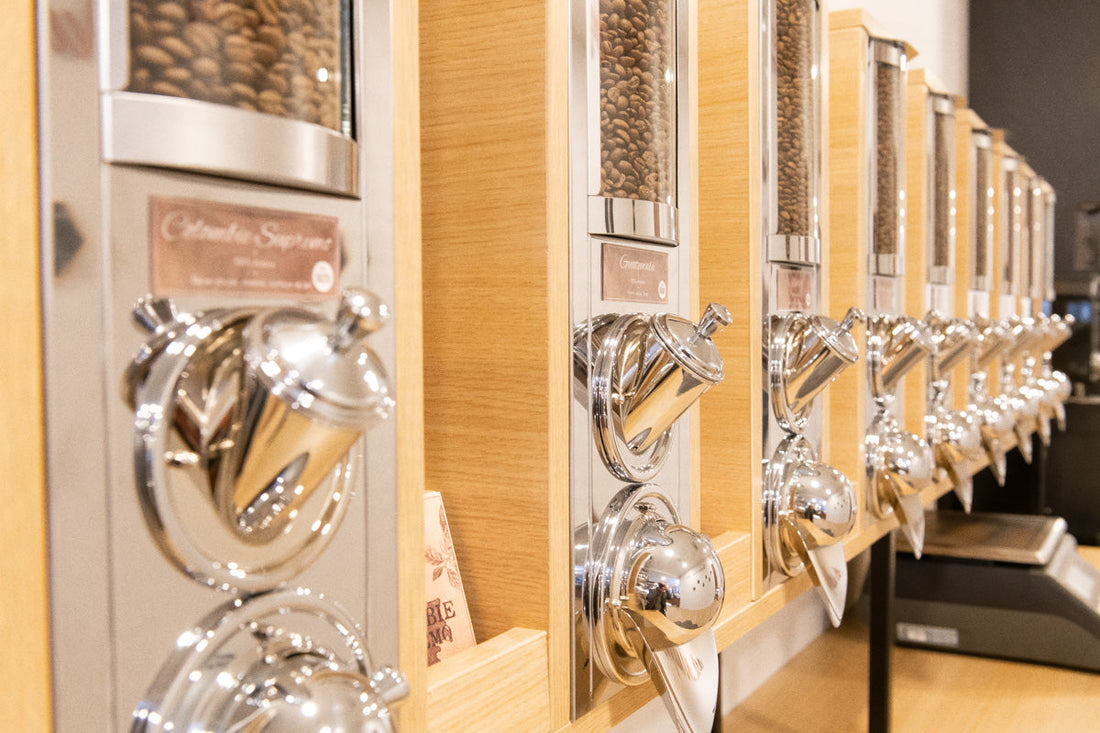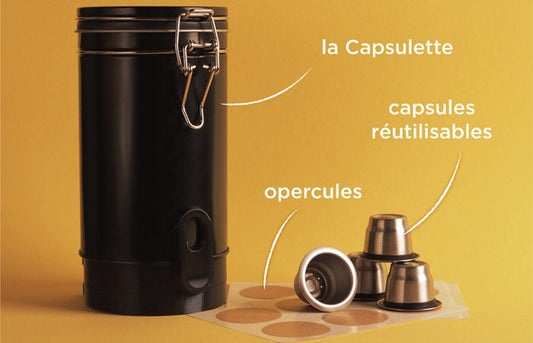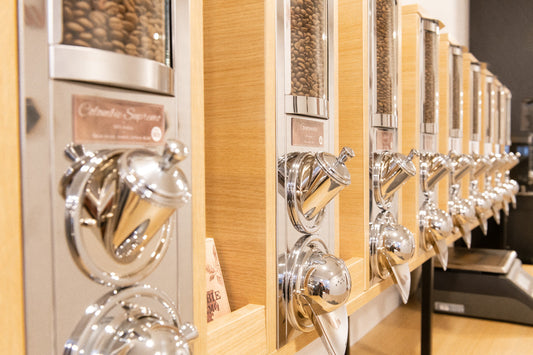
Choosing organic coffee is a first step toward more sustainable consumption. But be careful: "organic" does not automatically guarantee fair trade, traceability, or responsible transportation. To make the right choice, you need to look well beyond the green label on the packaging.
Truly responsible coffee combines several criteria: organic or fair trade certification, traceability back to the producer, fair pay, and optimized transportation. In this guide, we separate fact from fiction, explore greenwash-free labels, and give you all the keys to choosing your coffee consciously.
On the agenda: deciphering certifications, the importance of traceability, the realities of sailing transport and a selection of our best organic and responsible coffees.
Labels: what they guarantee… and their limits
A label is, above all, a minimum standard guaranteed by specifications. But not all are equal, and none covers all aspects of responsibility. Here's an objective breakdown of the main certifications.
Comparative table of coffee labels
| Label | What it guarantees | Limits / preconceived ideas | What to look out for |
|---|---|---|---|
| EU Organic/AB | Agriculture without pesticides, chemical fertilizers or GMOs | Does not guarantee fair trade or fine traceability | Check origin and social conditions |
| Fairtrade/Max Havelaar | Guaranteed minimum price, development bonus, social conditions | May allow certain chemical inputs | Look for the “organic + fair” label |
| Rainforest Alliance | Biodiversity protection, farmer training | Less strict standards than before the UTZ merger | Prefer with additional organic certification |
| 4C | Minimum sustainability standards (entry level) | Very basic, no fair bonus | Prefer more demanding certifications |
| Direct Trade | Direct roaster-producer relationship | No unified, self-declaring standard | Demand transparency on prices and conditions |
Remember: Organic doesn't mean fair trade. A well-paid and traceable conventional coffee can be more responsible than an organic coffee produced in poor social conditions. The ideal remains the combination: organic + fair trade + traceability.
Traceability and fair pricing: the heart of responsible coffee
What is true traceability?
Traceability goes far beyond country of origin. Traceable coffee tells you:
- The name of the farm or cooperative
- The region and altitude of cultivation
- The treatment process (washed, natural, honey)
- The aromatic profile and cupping score
- Cultivated varieties
This transparency guarantees a direct link between you and the producer, a guarantee of quality and fair remuneration.
The remunerative price, more complex than a minimum
The "right price" varies depending on the terroir, quality, local costs, and seasonality. An Ethiopian specialty coffee grown at 1,800 meters above sea level cannot command the same price as a Vietnamese robusta. What matters:
- A price higher than world prices
- A lasting business relationship
- A quality premium for micro-lots
- Transparency on the distribution of value
Questions to ask yourself before buying
- Who produced this coffee? Is the name of the farm or cooperative visible?
- What is the process and cup profile?
- Does the roaster explain its sourcing approach?
- Are there any additional certifications (organic + fair trade)?
- Does the price reflect the advertised quality?
Transport, carbon footprint and "sailing"
Coffee's Carbon Footprint: Where Are the Real Issues?
Contrary to popular belief, the carbon impact of coffee occurs primarily at the farm (deforestation, inputs, processes), then during roasting and at the consumer's premises. Maritime transport represents a relatively small part of the total footprint.
That said, optimizing transport remains relevant in an overall approach to reducing impact.
Sailing transport: principle and realities
Modern sailing transport uses hybrid cargo ships that combine wind and auxiliary engine power. Advantages:
- 50 to 90% reduction in CO2 emissions from transport
- Promoting an alternative maritime sector
- Longer transport time = natural maturation of the coffee
Limits to be aware of:
- Limited volumes (a few tonnes vs thousands for a classic cargo ship)
- Higher cost reflected in the final price
- Dependence on weather conditions and ship availability
- Complex logistics, not available for all origins
Practical tips to reduce the impact of transport
- Favor batches without air transport (more expensive, more polluting)
- Choose a local or regional roast
- Check for recyclable or compostable packaging
- Buy in larger quantities to limit deliveries
Cosy Coffee Selection: organic & responsible
Here is our selection of coffees that combine organic certification, exemplary traceability and social or environmental commitment:
- Ethiopia Sidama – Nyala BIO : Natural coffee with floral and fruity notes, Sidama Coffee Farmers Union cooperative, certified fair trade, altitude 1800-2000m
- Guatemala Kekchi Alta Verapaz BIO : Washed process, chocolate-hazelnut profile, Kekchi indigenous community, regenerative agriculture, complementary Rainforest Alliance certification
- Peru Cataratas San Andrés BIO : Micro-lot honey process, family cooperative of 45 producers, complete traceability down to the plot, remunerative price 40% above the market
- Bolivia La Paz Aymara BIO : High altitude coffee (2000m), Aymara community, traditional washed process, organic + fair trade certification, social education project
- Brazil Mogiana – Serra dos Ciganos : Certified sustainable farm, natural process, sail transport according to availability, caramel-almond profile, regenerative agriculture
- Ethiopia Yirgacheffe – Gedeb BIO : Gedeb washing station, jasmine and bergamot notes, certified organic and fair trade, micro-lot traceability, direct producer price
Discover our coffees transported by sail →
How to choose in 3 steps
Step 1: Define your priority
What matters most to you?
- Health/environment : favor organic + traceability
- Social justice : seek fair trade or transparent direct trade
- Carbon impact : opt for optimized transport + local roasting
- Taste : micro-lots traced with high cupping score
Step 2: Analyze the product sheet
A transparent product sheet must mention:
- Precise origin (farm, region, altitude)
- Process and varieties
- Certifications with official logos
- Tasting Notes and Score
- Producer's history or social project
Step 3: Test before adopting
- Start with a small size (250g)
- Choose the right grind for your equipment
- Test multiple origins to refine your preferences
- Use discovery packs to explore
Explore our responsible coffees →
Express FAQ
Is organic coffee necessarily better for the environment? Not automatically. Organic coffee from large, intensive farms can have a greater impact than conventional coffee from small, well-managed farms. The ideal: organic + traceability + regenerative practices.
Fairtrade vs. Direct Trade: Which to Choose? Fairtrade offers a recognized international standard with a guaranteed minimum price. Direct trade depends on the transparency of the roaster. When in doubt, choose Fairtrade or demand true price transparency.
Does sailing really change the carbon footprint? Yes, but only relatively. It reduces transport emissions, which represent 5-10% of coffee's total footprint, by a factor of 2 to 10. It's a real impact, but not revolutionary.
How can you recognize true traceability on a product sheet? Look for: farm/cooperative name, specific region, altitude, detailed process, cupping score, producer history. Be wary of vague statements like "high quality" without details.
Your checklist for an informed choice
Choosing organic and responsible coffee means combining four essential criteria: certification adapted to your values, transparent traceability back to the producer, fair price for the quality offered and optimized transport when possible.
No coffee is perfect in every way, but this approach allows you to make informed choices based on your priorities. The important thing is to support a more transparent and respectful industry, cup after cup.
Want to discover our selection? Explore our certified organic coffees and our sail-shipped batches to find your ideal sustainable coffee.


